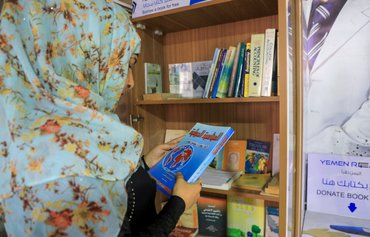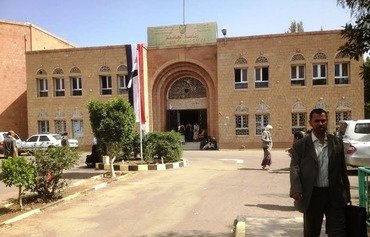ADEN -- Deserted hallways and quasi-empty classrooms have become a regular sight across public universities in Yemen this school year.
As transportation costs soar, many university students have had to suspend their studies, with some forced to find daily work close to home to help feed their families.
"The rise in transportation costs forced me and many other students to suspend our studies for this year, pending improvement in conditions next year," said Ali Mohammed, a student at Taiz University's Faculty of Arts in al-Turba.
Most of the students registered at the university's al-Turba branch live in surrounding rural areas, and have to commute a long way to school.
![The courtyard in Taiz University's Faculty of Arts appears deserted in December. [Naseem al-Sharaabi]](/cnmi_am/images/2021/12/30/33203-taez-university-yard-600_384.jpg)
The courtyard in Taiz University's Faculty of Arts appears deserted in December. [Naseem al-Sharaabi]
The cost of transportation to his university is between 2,000 and 3,000 YER ($8-$12) per day, Mohammed said, an amount few can afford.
On December 12, students at Taiz University's al-Turba branch held a two-day protest against the current economic conditions, demanding that the government intervene to improve conditions as well as the value of the rial.
Poor living conditions
Abdullah Saleh, another Faculty of Arts student, also blamed poor living conditions and the increase in prices, including transportation and tuition fees, on his decision to suspend his studies for this school year.
"My family's living conditions forced me to look for work instead of studying, to help provide for them," Saleh said.
An early December strike by the university's faculty was an additional reason for the suspension of studies by many, he added.
In a statement issued December 3, the teachers' union at Taiz University called on its members to strike in protest of the deteriorating economic conditions.
Public universities in Abyan, Hadramaut and Aden followed suit.
Yemen is going through one of the worst humanitarian crises in the world, according to the United Nations. The war that has been ongoing for more than seven years has led to the deterioration of living and humanitarian conditions, depreciation of the value of the national currency and rise in food prices.
Threat of school closure
Jalal Hassan, an official at Taiz University, told Al-Mashareq the economic hardship is the main reason one third of the university's students have suspended their studies.
Absenteeism is also prevalent among students who did not suspend their studies this year.
"This is a dangerous indicator," Hassan said, warning of the possibility of having to suspend classes for everyone if this trend continues.
"The university grants two years for a leave of absence to students who wish to suspend their studies for any reason," said Mohammed al-Daees, deputy dean of Taiz University's Faculty of Arts.
If two years lapse without the students returning to the university, they would not be able to enroll again for free but would be accepted in the parallel public university system -- for a fee, he said.
Yemeni prime minister Moeen Abdulmalik met with officials of the University of Aden on December 13 to discuss the demands of teachers at all public universities.
He said the government is devising a comprehensive plan to address the grievances of university faculty members and administrative staff, without providing more details.

![A classroom at Taiz University's Faculty of Arts is almost empty in December. [Naseem al-Sharaabi]](/cnmi_am/images/2021/12/30/33202-taez-university-empty-600_384.jpg)






